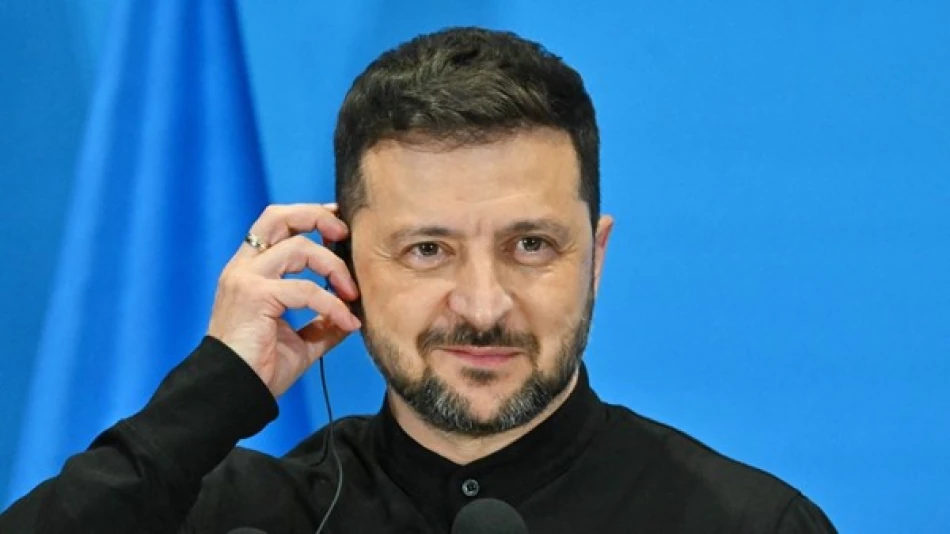
Ukrainian President Zelensky Firmly Rejects Territorial Concessions Amid Russian Invasion
Zelensky Rejects Trump-Putin Summit as Ukraine Demands Seat at Peace Table
Ukrainian President Volodymyr Zelensky has firmly rejected any peace negotiations that exclude Kyiv, warning that a planned summit between Donald Trump and Vladimir Putin would produce "dead solutions." As the two superpowers prepare to meet in Alaska next Friday, Ukraine's leader is drawing red lines around territorial concessions and demanding direct participation in talks that will determine his country's future.
Ukraine's Non-Negotiable Position
In a statement posted on Telegram, Zelensky made clear that Ukraine's territorial integrity, as enshrined in its constitution, remains non-negotiable. "Ukraine will not grant Russia any rewards for what it has done, and Ukrainians will not surrender their land," he declared, effectively ruling out the kind of territorial compromises that have historically ended prolonged conflicts.
This hardline stance reflects Ukraine's strategic calculation that any concessions now would only embolden Moscow for future aggression. Zelensky's position also signals to Western allies that Ukraine won't accept being sidelined in discussions about its own sovereignty—a concern that has grown as Trump has indicated willingness to negotiate directly with Putin.
The Alaska Summit: Bypassing Kyiv's Concerns
Russian presidential advisor Yuri Ushakov confirmed plans for the Trump-Putin meeting, noting it would be "completely logical" for the Russian delegation to fly across the Bering Strait to Alaska. The choice of location—neutral territory that avoids the diplomatic complexities of meeting in either country—suggests both leaders are serious about potential breakthrough discussions.
However, the summit format itself represents Ukraine's worst-case scenario: two nuclear powers deciding the fate of a smaller nation without its input. This echoes historical precedents like the 1938 Munich Agreement, where major powers carved up Czechoslovakia without Czech participation—a parallel not lost on Ukrainian officials.
Trump's Dealmaking Meets Geopolitical Reality
The planned summit represents Trump's transactional approach to foreign policy, where personal relationships between leaders can supposedly resolve complex geopolitical disputes. This methodology worked in some business contexts but faces severe limitations when applied to territorial disputes rooted in national identity and security concerns.
Trump's previous statements about ending the conflict "within 24 hours" suggest he may be willing to accept territorial concessions that Ukraine considers unacceptable. This creates a fundamental mismatch between American pragmatism and Ukrainian existential concerns.
European Allies Face Marginalization
Zelensky's concerns extend beyond Ukraine to broader European interests, warning that solutions excluding Ukraine would simultaneously work "against peace." This reflects deeper European anxieties about Trump's return potentially undermining NATO unity and the transatlantic alliance that has supported Ukraine since Russia's invasion.
The bilateral summit format also sidelines European Union leaders who have invested heavily in Ukraine's defense and would bear the consequences of any unstable peace agreement. Germany, France, and Poland have particular stakes in ensuring any settlement doesn't reward Russian aggression or create precedents for future territorial seizures.
Market and Strategic Implications
Financial markets will likely view the Trump-Putin summit as either a stabilizing factor that could reduce energy price volatility or a destabilizing precedent that undermines international law. Defense contractors and European energy companies have particular exposure to various settlement scenarios.
Strategically, how this summit unfolds will signal whether the U.S. under Trump will maintain its post-World War II role as guarantor of territorial integrity or shift toward a more transactional approach that accepts spheres of influence. This shift would have profound implications for Taiwan, the Baltics, and other territories facing pressure from larger neighbors.
The Path Forward
Zelensky's preemptive rejection of Trump-Putin agreements creates a potential crisis for any deal the two leaders might reach. Ukraine retains significant leverage through its military resistance and European support, meaning any agreement it doesn't accept would likely prove unenforceable.
The fundamental tension remains between Trump's apparent desire for a quick resolution and Ukraine's insistence that lasting peace requires Russian withdrawal from occupied territories. Without bridging this gap, the Alaska summit may produce headlines but little substantive progress toward ending the conflict.
Most Viewed News

 Layla Al Mansoori
Layla Al Mansoori






